Cra(i)gheads Online
A Site devoted to the search for our elusive Craighead and Craghead ancestors
[archives] [articles] [bios] [books] [archives] [message board]
The Name:
Surrounded in obscurity, argument, and illegibility
Spelling
Perhaps the most often asked question by genealogists of this family is, are we Craighead or Craghead? According to Rev. J.G. Craighead, in his 1876 work, 'The original emigrant to this country wrote his name Craghead; and we find it written occasionally, in early records, Creaghead, an evident error. It has been written for the last three generations, almost invariably, Craighead.'
It should be remembered that these were different times. There was no lexicographer in the English language until Dr. Samuel Johnson produced his Dictionary in England in 1755. Doubtless, as a first work, it was more to the attention of scholars than laity. Webster did not produce a dictionary until 1806, and this was an incomplete work; the work we associate with Noah Webster today was not first printed until 1828. A quick perusal of the letters of the Founders will show that even educated men often did not know how to spell!
According to Mrs. W.B. Craghead, in her 1953 work: 'The spelling of the family name is found both ways... the spelling, however, making no difference in the relationship between them, even tho there was a strong difference of opinion as to the way it SHOULD be spelled.' She goes on to describe two full brothers who settled in Missouri, Robert M. Craghead and Isaiah Craighead, who would argue almost to the point of fighting for their two opinions on the matter. 'It appears to be a matter of individual choice,' Dorothy continues. 'as descendants... (even brothers and sisters) now use either spelling.
'The Scotch have a tendency for using an 'i' in many of their words, (like 'laird' for 'lord', etc,), while the English and we Americans have a tendency to simplify our spelling by leaving it out. Thus, we can readily see how Craighead in Scotland would become Craghead in England and America.
'It has been the belief of some that the old Scotch spelling should be retained, out of respect and pride of it's origin, with the 'i' being used as their mark of distinction... yet in practically all early records we found in Virginia, the 'i' was omitted, giving rise to the belief that this particular progenitor preferred the latter spelling for reasons of his own, perhaps. It is regrettable that there is no longer any hard and fast rule for identifying the... lines.'
So it appears that the original and proper spelling, in what is now known as 'Middle Scots', was CRAIGHEAD. However, for reasons known only to themselves, certain members of the family thought it fit to shorten the name, and the form CRAGHEAD persists today.
Origins
There are a number of locations known as Craighead today in Scotland. There is a large private home, since converted to other uses, in Lanarkshire. There is also a mill by that name in that shire. The proximity to Glasgow, where the Reverends Craighead preached in the late 17th century, suggests that these locales were probably named for them.
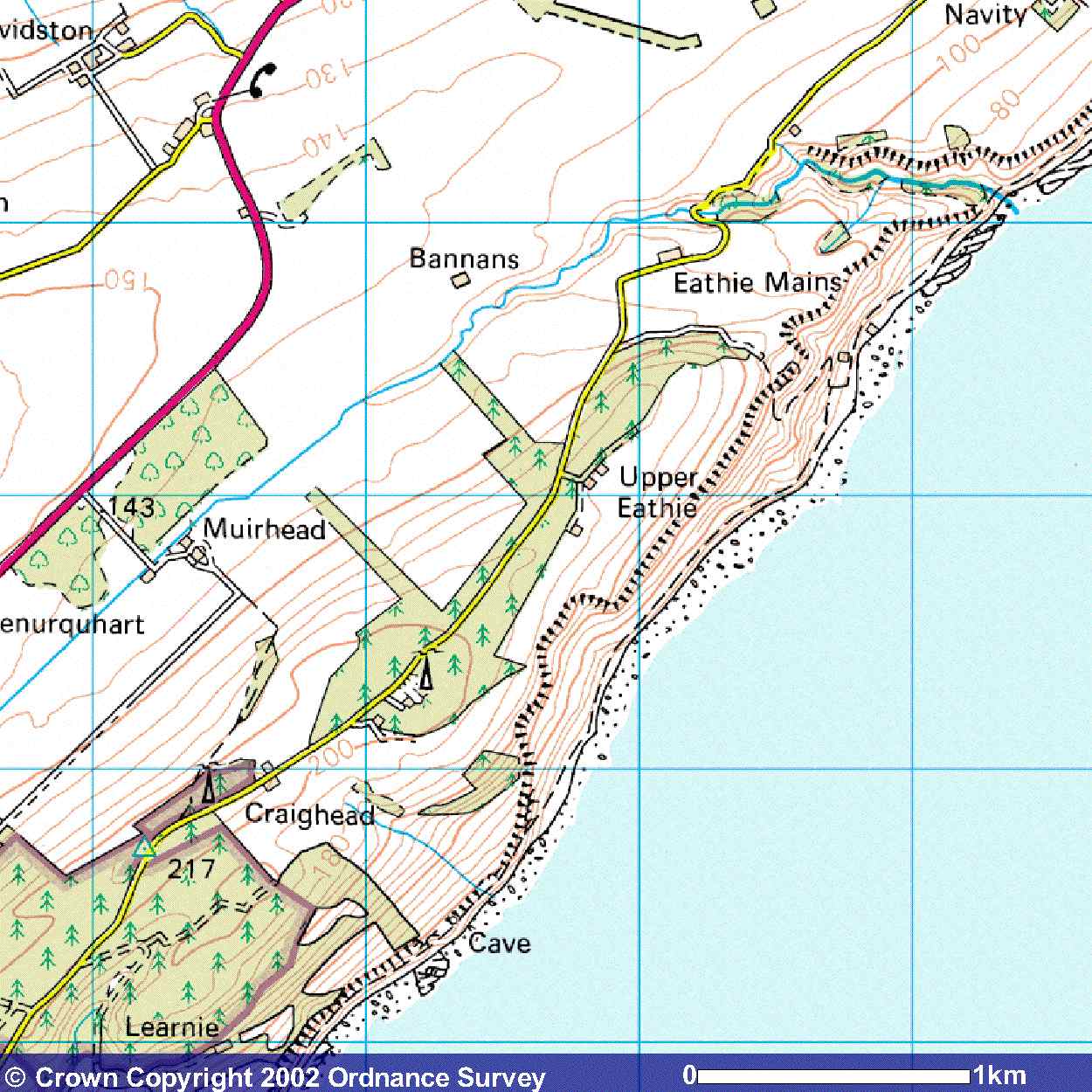 Craighead, Ross, Scotland [click on image to view larger map] Image courtesy Ordnance Survey Get-a-map service. Image reproduced with kind permission of Ordnance Survey and Ordnance Survey of Northern Ireland. |
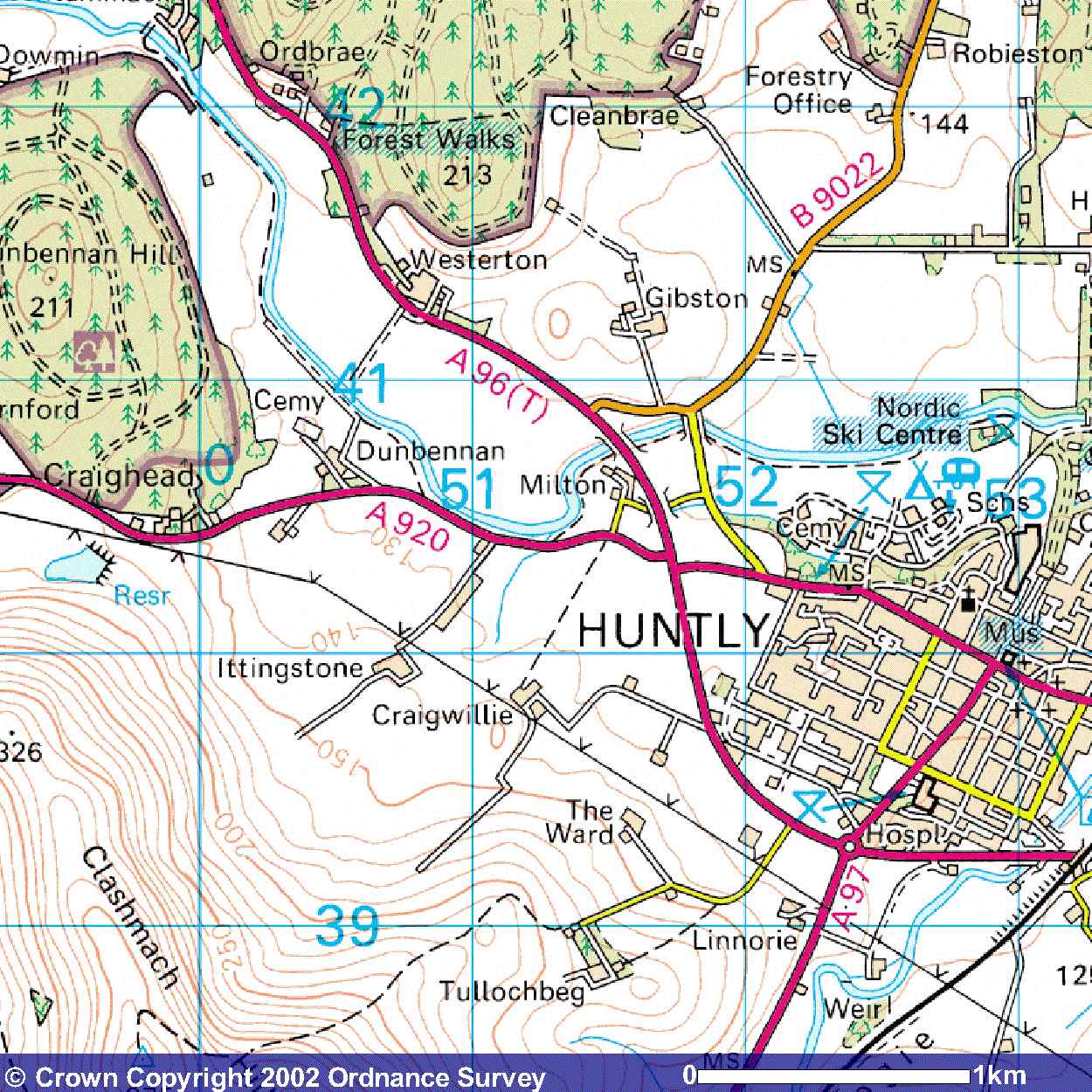 Craighead, Aberdeenshire, Scotland [click on image to view larger map] Image courtesy Ordnance Survey Get-a-map service. Image reproduced with kind permission of Ordnance Survey and Ordnance Survey of Northern Ireland. |
There also is a prominence on the north coast near the town of Cullen, in modern Morayshire; also there is a village on the main east-west road out of Huntly, in northwest Aberdeen. In the Highlands, north of Moray, north of the town of Inverness, on the west side of Rosemarkie Bay, there is a small village known as Craighead. Most intriguingly, there is a stone circle in Badentoy, a small distance outside the royal burg of Aberdeen to the south; it is however, of uncertain origin.
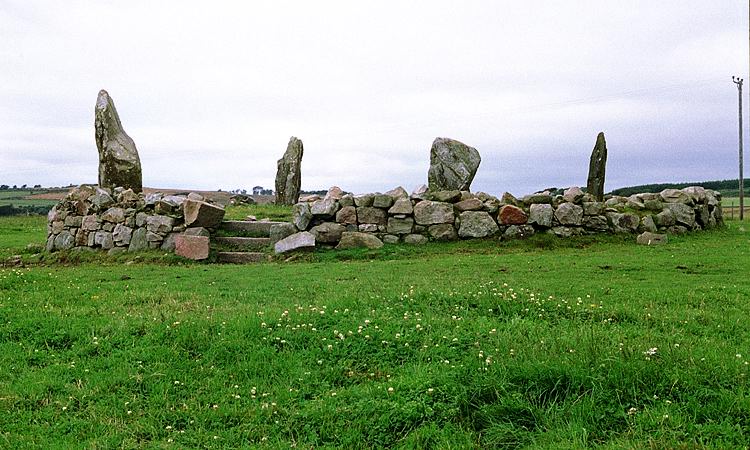 Craighead of Badentoy, Kincardineshire, Scotland Stone Circle, Four Poster. View from Southeast, 1987. Photo courtesy of Megalithics, used with kind permission. Copyright 2002 Maggie & Keith Davidson, all rights reserved. |
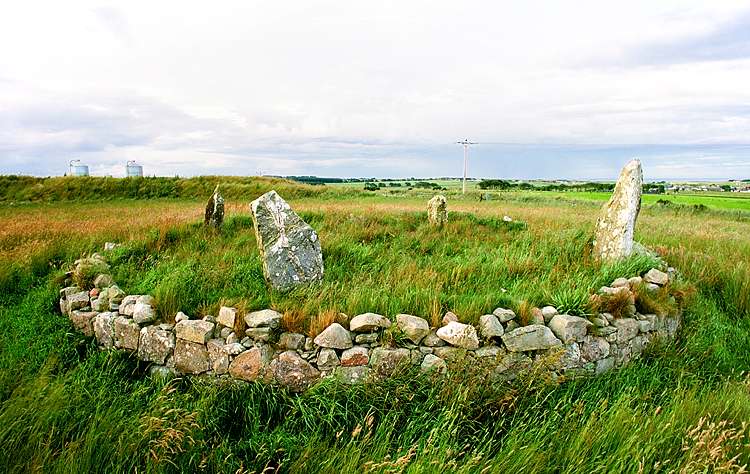 Craighead of Badentoy, Kincardineshire, Scotland Stone Circle, Four Poster. View from West, 1999. Photo courtesy of Megalithics, used with kind permission. Copyright 2002 Maggie & Keith Davidson, all rights reserved. |
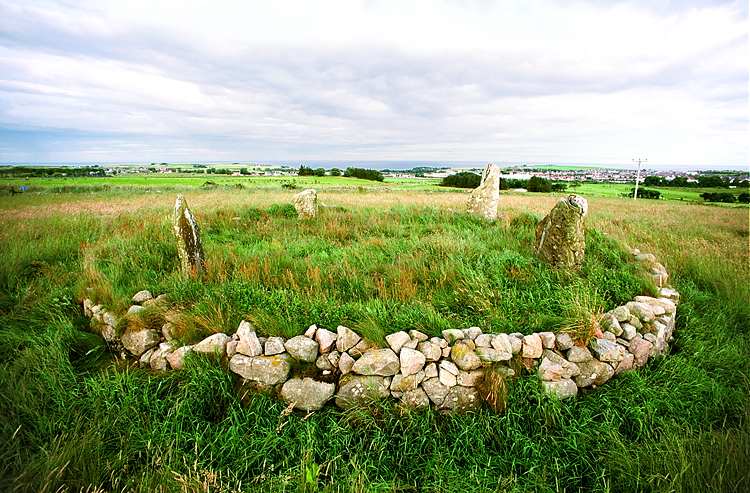
Craighead of Badentoy,
Kincardineshire, Scotland
Stone Circle, Four Poster. View from
Northwest, 1999.
Photo courtesy of Megalithics,
used with kind permission.
Copyright 2002 Maggie & Keith Davidson,
all rights reserved.
Also, in Fife, near the point of Fifeness and just to the NE of Crail, (where there is a modern golf course named Craighead,) is another village known as Craighead.

Craighead, Fife, Scotland
[click on image to view larger map]
Image courtesy Ordnance Survey Get-a-map
service. Image reproduced with kind permission
of Ordnance Survey and
Ordnance Survey of Northern Ireland.
According to the 'Retours of Services of Heirs', ('Inquisitionum Ad Capellam Domini Regis Retornatarum Abbreviatio',) which covers the period from 1544-1699, there was a Barony established by the name of Craighead in Fife. As, at the time that Burke's Landed Gentry for Scotland was compiled, this fuedal Barony was not listed. As Baronies are perpetual, unless rescinded by Parliament, these Baronies still exist, but have fallen out of use, possibly because their inheritance is in dispute. If this Barony has any connection to this family, and if it's story can be learned, more will be posted.
It has, however, been brought to the attention of the compiler that the origins of Scotch place-names are not necessarily the same as the origin of surnames. Also pointed out was that the use of surnames was spotty and often nonexistent in Scotland up until relatively modern times.
Again, from Rev. J.G. Craighead: 'the name Craighead is unmistakably Scotch in origin; Craig or Crag signifying in Scotland any rocky locality. CRAIG: 'A parish in Forfashire, and an estate in Perthshire. As a topographical expression, Craig has the same meaning as Carrick. The southern district of Ayrshire is so called.' (Patronymica Britannica.) Craighead: A place in the parish of Dailly, County Ayr. (New England Historical and Genealogical Register.)'
Certainly, there has always been a tradition that the name is descriptive, meaning that the family 'came from the Craig's head'. While this is theoretically possible, the likelihood that the name Craighead may originally have been Gaelic may mean that the present spelling is an Anglicized form, and that the words Craig and Head may have no relation to their English meaning.
Paul Craighead in his work states that the Gaelic name was deCarraig, (which is actually a hybrid of the French preposition 'de'=of, and a form of the word Carrick, Carraig, which has the same meaning, in geography, as Craig or Crag.) The compiler has found no evidence of this name, however, or of any connection to this name if it exists. If anyone can offer further information on this form, please contact the compiler.
The earliest record of the surname, according to Black, in his Surnames of Scotland, is that of David Craighead, who appears as a witness in Aberbrothock, (modern Arbroath, south of Aberdeen in Kincardineshire,) in 1546. William Craigheid, 'Baxter' in Aberdeen, is recorded in 1613, and in Fidesbieg, in 1633, John Craigheid is recorded. Black also mentions the name Craghede in 1492.
Pronounciation
Finally, we will deal with how it's said. Although spelled CRAIGHEAD, the name is often spoken quickly, and it comes out slurred: CRAG-ed. Indeed, this slurring is common in Scotland: anyone who has studied the issue of language in that country for long will find there is a disconnect, more so in the past, between the spelling of a word and it's pronounciation. (Edinburgh is said Edin-burra.)
Also, the consonant pair GH is not silent, as in the English word 'thorough'; rather, it is pronounced, and in a very guttural, gravely tone. The surname McLaughlin, for example, is pronounced MacLagcklin. And the vowel combination AI is pronounced as in AIR. Applying this rule to the surname, CRAIGHEAD phonetically becomes CRAWGK-ett. (Roll the GH on the back of your tongue.)
From this you can see how the name was corrupted on the 1840 Federal Census of Smith County, Tennessee, as Craget and Craged; how a pair of orphans in that same county in 1801 were called Crogget by the court there; how a family that went to Texas spelled their names Crogget as well; and so on, and so on. The compiler has been told as well that this distinctive pronunciation still exists with some in Tennessee.
Backing up this is a comment in a letter to Dorothy by J.D. Craighead, dated May 27, 1944, which was included in her first book: 'I might stop here to tell you the proper pronounciation and how I found it out. When I was superintendent of a school down in South Carolina, I invited Judge Hudson, an old Scotchman, to deliver the Commencement address. When he got off the train, I introduced myself. He said, 'How did you say?' I said Craighead like Craig. He said, 'Well, you don't know how to pronounce your own name; it's Croghed." (Short 'o' like in log with the last syllable clipped.) Later I found that the Scot was more like 't' than 'd' at the end. This reminds me that the famous David Crocket was really a Craighead; he just spelled it like it was pronounced. In fact, Davy could not spell until his wife taught him to; hence the change of the name.' J.D. states that Judge Hudson came from Charlotte, and learned the pronounciation from a family there- the compiler speculates that this was the family of Rev Alexander Craighead, as they were the prominent members of Charlotte.
Sources
- The Craighead Family..... 1658-1876, by Rev. J.G. Craighead
- The Cra(i)ghead Family of Va-Mo, by Mrs. W.B. Craghead
- The Craighead Family of Western Virginia, by Paul D Craighead
- The New History of Scotland, (Series), 1982
- Correspondence, (Various)
- Megalithics, http://web.ukonline.co.uk/megalithics/index.htm